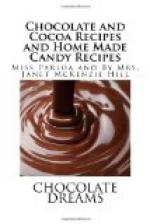“It is a perfect food, as wholesome as delicious, a beneficient restorer of exhausted power; but its quality must be good and it must be carefully prepared. It is highly nourishing and easily digested, and is fitted to repair wasted strength, preserve health, and prolong life. It agrees with dry temperaments and convalescents; with mothers who nurse their children; with those whose occupations oblige them to undergo severe mental strains; with public speakers, and with all those who give to work a portion of the time needed for sleep. It soothes both stomach and brain, and for this reason, as well as for others, it is the best friend of those engaged in literary pursuits.”
M. Brillat-Savarin, in his entertaining and valuable work, Physiologie du Gout, says: “Chocolate came over the mountains [from Spain to France] with Anne of Austria, daughter of Philip III and queen of Louis XIII. The Spanish monks also spread the knowledge of it by the presents they made to their brothers in France. It is well known that Linnaeus called the fruit of the cocoa tree theobroma, ‘food for the gods.’ The cause of this emphatic qualification has been sought, and attributed by some to the fact that he was extravagantly fond of chocolate; by others to his desire to please his confessor; and by others to his gallantry, a queen having first introduced it into France.
“The Spanish ladies of the New World, it is said, carried their love for chocolate to such a degree that, not content with partaking of it several times a day, they had it sometimes carried after them to church. This favoring of the senses often drew upon them the censures of the bishop; but the Reverend Father Escobar, whose metaphysics were as subtle as his morality was accommodating, declared, formally, that a fast was not broken by chocolate prepared with water; thus wire-drawing, in favor of his penitents, the ancient adage, ’Liquidum non frangit jejunium.’
“Time and experience,” he says further, “have shown that chocolate, carefully prepared, is an article of food as wholesome as it is agreeable; that it is nourishing, easy of digestion, and does not possess those qualities injurious to beauty with which coffee has been reproached; that it is excellently adapted to persons who are obliged to a great concentration of intellect; in the toils of the pulpit or the bar, and especially to travellers; that it suits the most feeble stomach; that excellent effects have been produced by it in chronic complaints, and that it is a last resource in affections of the pylorus.
“Some persons complain of being unable to digest chocolate; others, on the contrary, pretend that it has not sufficient nourishment, and that the effect disappears too soon. It is probable that the former have only themselves to blame, and that the chocolate which they use is of bad quality or badly made; for good and well-made chocolate must suit every stomach which retains the slightest digestive power.




